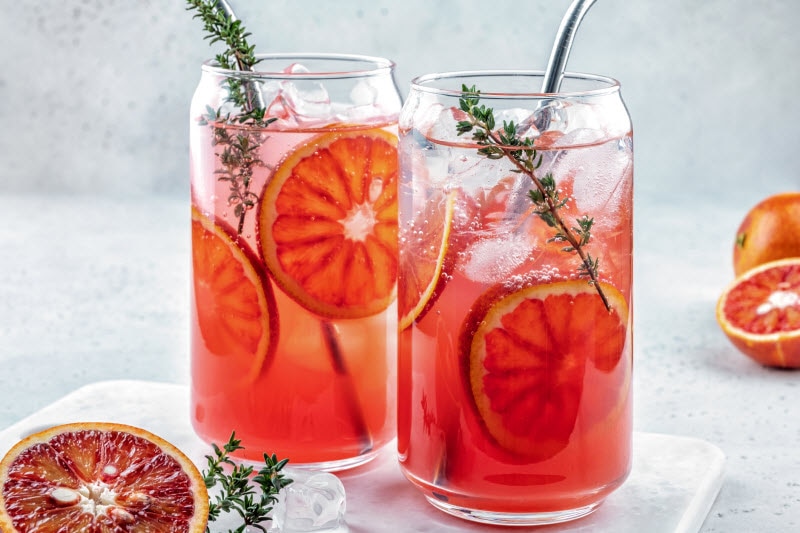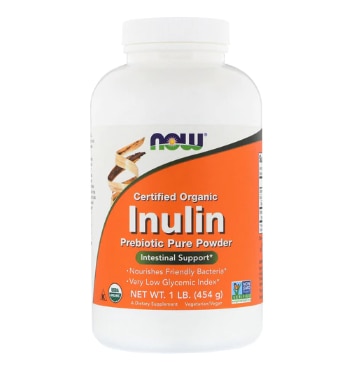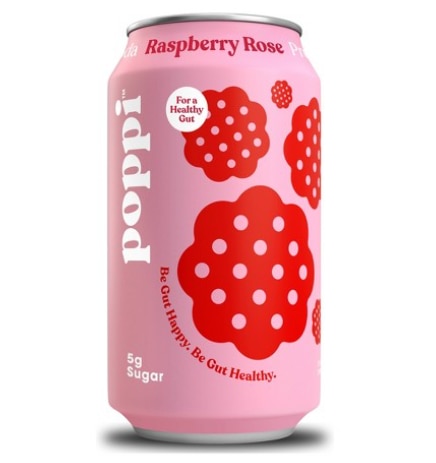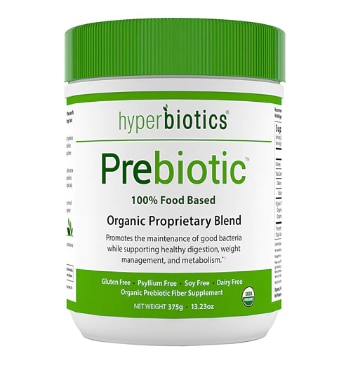Prebiotic drinks, including prebiotic sodas, are popping up on social media and taking over shelves in stores from Whole Foods to Walmart. Adding functional fibers to fizzy favorites may sound like a recipe for a robust microbiome, but is prebiotic soda good for you, or are the purported benefits all just hype?
First, what is prebiotic soda?
Prebiotic sodas are marketed as healthier soda alternatives enriched with one or more plant fibers. Most brands contain soluble fiber, which doesn’t break down during digestion. Instead, it passes into the large intestine, where gut microbes feed on it and produce byproducts like short-chain fatty acids (SCFAs).
Inulin is the most common type of fiber in prebiotic soda. Made up of a chain of fructose molecules, this soluble fiber usually comes from sources like chicory root and agave. One popular brand combines several different types of fiber from chicory, marshmallow root, cassava and nopal cactus to provide a diverse range of prebiotics.
Poppi includes apple cider vinegar (ACV) along with agave inulin for additional digestive benefits. ACV has antimicrobial properties that could, in theory, help reduce unhealthy gut bacteria like E. coli and C. albicans. Many people also use ACV to reduce gas and bloating, although no studies have been done to prove its efficacy.†
Prebiotic soda benefits
Consuming prebiotics is associated with several health benefits due to how they affect the gut microbiome. Soluble fiber increases microbiome diversity, which is correlated with lower instances of chronic disease and better overall health.† Increased prebiotic fiber intake is also associated with lower inflammation.† This could be due to the anti-inflammatory effects of SCFAs or the interplay between some microbes and the immune cells that line the gut.†
SCFAs can have beneficial immune effects in other areas of the body. These compounds interact with innate and adaptive immune cells to maintain balance and strengthen responses to infections.† SCFAs also protect against intestinal permeability (“leaky gut”), which can help prevent pathogens and proteins from entering the bloodstream and triggering allergic reactions.†
OK, so what about actually drinking prebiotic soda?
Although science shows widespread correlations between prebiotics and gut health, evidence for specific prebiotic soda benefits is lacking.
Part of the problem may be how prebiotic drink processing methods affect the amount of fiber in the final product. And sodas enriched with prebiotics contain far fewer types of fiber than whole plant foods, the natural source of prebiotics. In fact, diversity of plants—not functional beverage consumption—is one of the most reliable predictors of a healthy microbiome, largely due to the high fiber content of these foods.
Are there any side effects of drinking prebiotic soda?
Some prebiotic drinks can have as much as nine grams of fiber per 12-ounce can, more than half of what most Americans get in their daily diets. Rapidly increasing your fiber intake from foods or prebiotic drinks can cause uncomfortable digestive side effects, including:
- Gas
- Bloating
- Cramping
- Constipation
- Loose stools
- Uncomfortable feelings of fullness
To reduce the chances of experiencing these side effects, avoid drinking more than one prebiotic soda per day. Some of these drinks can have as much as nine grams of fiber per 12-ounce can—that’s about three-quarters of what most Americans consume in their daily diets. All that fiber pulls water into your stool, so balance your soda consumption with water to keep yourself hydrated.
It’s important to get fiber from food sources, too, not just from drinking soda. Diversifying fiber intake can prevent constipation and diarrhea as you increase the amount of fiber you eat each day. Work your way up to a higher fiber intake slowly over the course of a few weeks to give your microbiome time to adjust.
Who shouldn’t drink prebiotic soda?
For some people, though, prebiotic drinks are a no-go. Gasses produced as gut bacteria break down fibers like inulin may worsen symptoms of IBS or cause gastrointestinal distress if you’re sensitive to FODMAPs.
Since chicory is part of the daisy family, you may be at risk of an allergic reaction from sodas containing chicory fiber if you also react to daisies, dandelions, sunflowers, or chamomile. Chicory has additional potential to cross-react with birch pollen and trigger symptoms of oral allergy syndrome in people with seasonal allergies.
How to choose the right prebiotic soda for you
If you don’t have allergies or a condition like IBS, prebiotic soda can be an enjoyable alternative to traditional soda. Many brands offer classic flavors like cola, root beer, and ginger—as well as fun new combinations to try.
Pay attention to ingredients as you compare brands. The healthiest prebiotic sodas are free from:
- Excessive sugar
- Artificial sweeteners
- Artificial colors
- Artificial flavors
- Chemical additives
Keep in mind that switching to drinks with prebiotics may not provide the gut health benefits that some brands profess. If your goal is a healthier microbiome, consider a more widespread dietary change that includes replacing sugary drinks and ultra-processed foods with high-fiber options like fruits, vegetables, beans and whole grains.
Choosing prebiotic soda may have benefits unrelated to the fiber content that make it worth the switch. Many brands use less sugar than traditional soda or add alternative sweeteners like monk fruit, which can help reduce your sugar intake if you’re trying to cut back on sweetened beverages.
So, should you switch to prebiotic soda?
Swapping regular soda for a lower-sugar drink infused with prebiotics can add more fiber to your diet and possibly improve your gut health. However, science hasn’t yet demonstrated that drinking soda can have the same microbiome-boosting effects as eating high-fiber foods. So pack your plate with plants, and enjoy prebiotic soda as a tasty treat when you’re in the mood for a healthier alternative with classic soda flavor.
†These statements have not been approved by the Food and Drug Administration. These products are not intended to diagnose, treat, cure or prevent disease.




